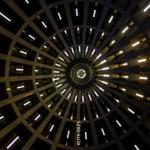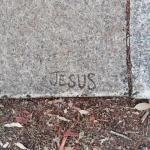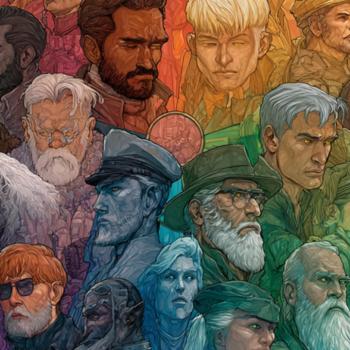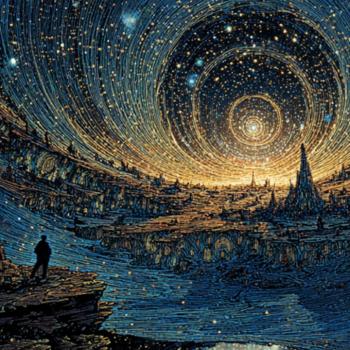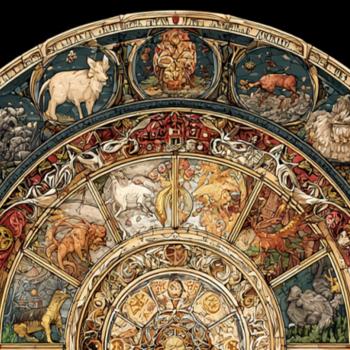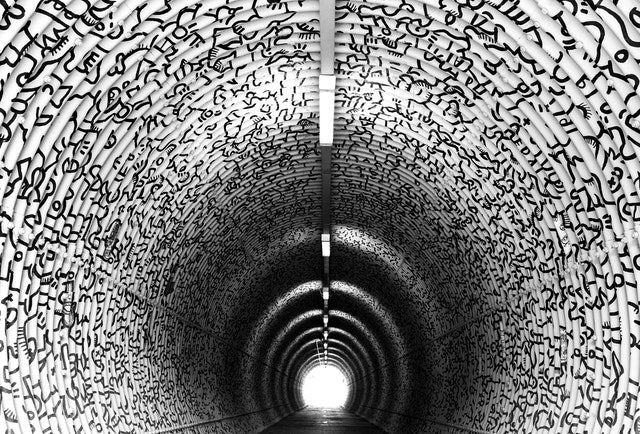
“The only true wisdom is in knowing that you know nothing.”
SOCRATES
“What is fear? Nonacceptance of uncertainty. If we
accept that uncertainty it becomes an adventure.”
RUMI
Right off the bat, I feel the need to confess something to you. It’s not something I’m very proud of, but I think it’s important to get this out
there right from the very start.
To do this, I’ll need to tell you a little story. It’s about the day I was driving home in my car from work, talking to God, and expressing
my concern that there wasn’t really anything left for me to learn about the Bible, or Theology.
Seriously. I actually said these words out loud to God as I was driving down the freeway in Southern California at the ripe old age
of 27: “There’s really nothing about the Bible I don’t already know the answers to,” I sighed. “I feel like there really aren’t any new things for
me to learn when it comes to my faith.”
Somewhere in Heaven there must have been an inaudible roar of laughter. But, I was dead serious. As a licensed and ordained minister, I had taught Bible Studies, preached from the pulpit, studied apologetics, read dozens of books on theology, taught seminars on Creation and Evolution at two different churches, led Sunday School programs for young adults and children alike, and basically, become the Bible Answer Man for anyone who was foolish enough to ask me
a question about Christianity.
On one level, I was right. Sort of. I mean, I did have a lot of information. I had studied a lot about my faith. I had even studied
philosophy and world religions at University. As far as I knew, I was an expert on theology and there was really nothing more for me to
learn.
Sadly, once anyone reaches the point where they believe they already know everything, there really is nothing more you can teach
them. Once you stop looking for answers, your brain stops learning and your curiosity dries up fast.
That’s where I was that day in my car. My mind was closed. My ability to grow beyond that point in my life was frozen stiff. The
cement had officially hardened.
So, what came next was not only a surprise to me, it was actually the most wonderful thing that could have possibly happened to me: I
lost the job I loved and became unemployed for over a year.
Why was that so great? Well, to be honest, I really didn’t think it was so great at the time. In fact, I was pretty sure it was the worst
thing that had ever happened to me in my life up to that point. But, eventually, I began to see how this unexpected turn of events was
actually the answer to that unintentional prayer I had spoken in my car that day.
Over the next year, I would struggle to find full-time work. Even though I had over 7 years of experience in the Christian Music
Industry under my belt, knew dozens of people at some of the top record labels in the country, and interviewed for jobs that practically
had my name on them, I could never find anything, no matter how hard I tried. During that time, I worked temporary jobs typing forms,
answering phones, managing spreadsheets, updating warranty cards, and all sorts of other things, just to pay our bills and keep our two
young boys fed and a roof over our heads.
That was honestly one of the most difficult and painful seasons of my entire life. It was humbling, and humiliating. I remember standing
in line to fill up a grocery sack at the local food pantry. I remember praying on my knees for hours just begging God to give me a job, and
turning in resume after resume, month after month, with no answers or job offers in sight.
But, if you want to know the truth, I wouldn’t trade that experience in my life for anything in the world. Here’s why: Because it was only
during that painful, challenging, difficult season in my life that I learned something I could have never understood from a sermon, or a
Bible study, or a theology book.
What I learned during that time was simply this: God saw me, and God loved me, and God was determined to provide for me and my family no matter what. Now, if you had asked me if I knew that God loved me, or that God was my provider a few years prior to this ordeal, I would certainly have said, “Yes, I know that.”
But, until I had to literally depend on God for my daily bread for more than a year, I really did not know that God loved me, or that God would provide for me in the same way. Before this experience, I might say that I knew the love of God was real, or that God was my source, but it wasn’t until I had truly
experienced those things in a tangible way that I really, truly knew that love and that provision in my bones.
So, it wasn’t until a few years later that I remembered that conversation with God in my car that day. When I did, all of those
experiences of God’s love and provision, and daily care came flooding back to me. I laughed out loud. Because I could see, on the other side
of that experience, just how little I really knew anything about God, or faith.
Suddenly, I had eyes to see just how little my understanding of God was based on my actual experience of God. Up to that point,
everything I thought I knew about God was mere information on the page, or theories I had memorized to impress people around me.
Until all I had left to hold on to was God, I really didn’t know the God I was holding on to.
Why do you think I told God there was nothing more for me to learn that day in the car? Wasn’t it obvious I had lost my sense of
wonder? For me, every question had been answered. Every mystery had been solved. As far as I could see, there was nothing left to learn.
But, of course, I couldn’t have been more wrong.
My season of economic uncertainty helped to awaken me from my slumber. It opened my eyes to levels of faith that I had never
even imagined were possible. It even showed me that the things I thought I knew so well were woefully incomplete. There were facets
of God’s love I had yet to understand. There were dimensions to God’s character I had still not imagined. I knew God loved me because the
Bible said so. But I didn’t know just how much God loved me, nor what forms that love could take, until I was absolutely helpless to do
anything other than cling to God’s love with every ounce of strength in my body.
Now, I feel the need to stress something here before we continue: God did not cause me to lose my job. There were all sorts of factors
in play that led me to that event and I do not believe that God was one of them.
However, we do know that Jesus warned us that “in this life you will have trouble.”
So, trouble comes to everyone. We all have to go through hard times, no matter who we are, or how much faith
we have, or how spiritual we may be. The Apostle Paul suffered. All of the Twelve Disciples suffered. The early Christian church suffered
for over 300 years. Even our Lord Jesus suffered and died.
Suffering is something we all must endure in this life.
No one gets out alive, or unscathed.
But, we do have this promise from God that says, “I will never leave you, nor forsake you.”
In other words, we may all go through the darkness, but we never go through that darkness alone. God is always at our side, weeping when we weep, suffering when we suffer, groaning when we groan and sharing that pain with the Father in words we cannot express.
So, God did not create my suffering. But, gladly, God certainly worked in and through my suffering to show me things I could never
have seen otherwise. For that, I am so very grateful.
During that time of my life, a friend gave me a copy of a little book that became a lifeline for me and my wife. It was the book,
“Let Go” by a guy named Fenelon. That book was like manna for our souls, to be honest. Every evening before bed, we would read a chapter
together out loud and it felt as if it had been written just for us that very day. On one of those evenings, we read something that has never
left me.
In fact, I quote it all the time as a reminder to myself, and hopefully as an encouragement to others. It was this: “If you stopped
learning now, you wouldn’t live long enough to put into practice all that you already know of Christ.”
This quote resonates with me on so many levels. First, it speaks to the need to stop thinking about my faith as the mere accumulation
of information.
The Gospel is not about acquiring knowledge that fills our brain. It’s about encountering a God who fills our heart and
transforms our soul from the inside out.
Secondly, that quote reminds me to put what I know of Christ into practice. Because our faith is primarily about how we live, not what we know. Knowing is fine.
It’s obviously important. But, without the practice of our faith each day, that faith is worthless.
Or, as James phrased it: “Faith without
works is dead.” And the thing I’ve learned about faith is that nothing
kills it quicker than our sense of certainty.
No, it’s not our doubts or our questions about God that threaten our faith, it’s our absolute
conviction that we already have God all figured out.
The way some of us talk today, it’s as if we’ve forgotten that God is a being beyond our comprehension.
Instead, we have become convinced that we’ve got God in a box, or maybe bound in a Book, that is filled with
answers that cannot ever be questioned.
But, deep down inside, even those who appear the most confident in their answers know the truth: God is bigger than our box, and God
is beyond our Book, and the reality of God expands further than any answers we could ever put into words.
To know God is to know wonder. To experience God is to become acquainted with awe. To approach God, one must come empty-handed.
It is our sense of curiosity that draws us closer to the Divine.
It is our desire to know and be known that compels us to seek, search,
and inquire.
That question mark buried deep within our soul is like a compass that points us towards the magnetic north where God dwells
in unapproachable light, shrouded in mystery, covered in darkness, and yet we hear that still, small voice calling out to us, “Be still and
know … ” like the rise and fall of our own breath.
When we lose our sense of wonder, we lose our connection with the Divine. Once we become convinced—as I once was all those years
ago—we find ourselves trapped in a prison of our own certainty where we foolishly believe we have answered every question and uncovered
every mystery. But, of course, nothing could possibly be any further from the truth than this.
We cannot speak about God without admitting that what we are speaking of is something so far beyond our understanding, so
inexpressible by our language, so incomprehensible by our minds, that to approach this concept accurately, we simply must do so with
great humility and a sober sense of our own inability to fully grasp the great mystery that we call “God.”
Of course, the real danger of becoming certain about God is that we inevitably end up creating a version of God in our minds that
looks and behaves a lot like us. We construct a false image of the Divine that hates the same people we hate and affirms everything we
already are.
This is not the real God. It’s the one we invent out of thin air. As Henri Rousseau famously observed, “God created man in His
own image and then man returned the favor.”
This is why the illusion of certainty is so dangerous and why admitting the truth—that God is
beyond our comprehension—is where true theology begins.
My hope in this book is to help us regain our sense of wonder again. To find joy in the everyday things. To experience a healthy dose
of awe as we go through our day. To become curious once more about the incomprehensibly beautiful world we live in, and the endlessly
fascinating Creator who takes great delight in our childlike curiosity.
This book is not about finding answers. If anything, I hope to whet your appetite for better questions that lead you down the rabbit hole
to even better questions that you’ve probably never even considered before.
Where we’re going there is no road. There is no map. There are no rest areas. This will be our journey into the unknown. To travel
this road, we may need to let go of our assumptions. We may need to hold loosely to those things we thought we knew for certain. In fact,
if we’re not willing to have all of those things stripped away, we may never really make it all the way.
If you’re convinced there is nothing more for you to know about God, or life, or the world around you, then maybe this isn’t the
book for you. But, if you’re ready to entertain the possibility that there is more to know than you could ever imagine—then maybe,
just maybe—you’re ready to embrace this beautiful mystery and start pulling away the curtain to discover all the marvelous things you don’t
know.
I don’t know about you, but I can’t wait to get started.
Here we go!
[Excerpted from the Introduction to the new book SOLA MYSTERIUM: Celebrating the Beautiful Uncertainty of Everything by Keith Giles]Available June 28th on Kindle and in Print from Quoir Publishing on Amazon.
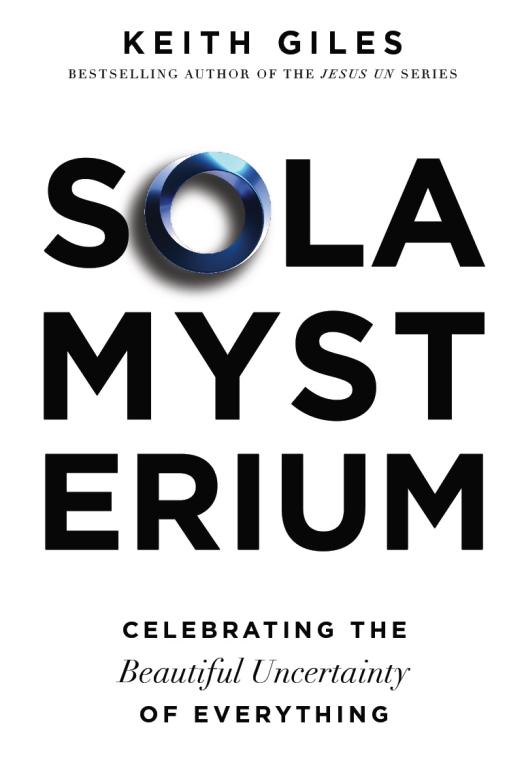
**
The opposite of faith is not doubt, it’s certainty.
We cannot talk about God with any degree of certainty, because God is, by definition, a Being who transcends imagination, expectation and comprehension. What we know is this: there is more of God to know than any of us will ever fully know in this life.
So, let’s begin by embracing the mystery of Christ to discover the endlessly unfolding beauty of uncertainty.
This is the Sola Mysterium.
**
Keith Giles is the author of the 7-part best-selling Jesus Un book series from Quoir Publishing. Keith is also the host of Second Cup with Keith [a new solo podcast available now on the Ethos Radio App, for Apple and Android and on Spotify; and the Heretic Happy Hour Podcast [along with co-hosts Matthew Distefano, Dr. Katy Valentine, and Derrick Day], and the new Apostate’s Anonymous podcast with Matthew Distefano.


